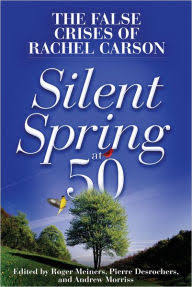
Reviews
A powerful collection that offers new insights on Carson’s epoch-making book and challenges its scientific underpinnings and purpose. This book should stir even the most committed Carson enthusiast to reassess Silent Spring’s much celebrated status. A must read for those who take the environment seriously.
— Bruce Yandle
Dean Emeritus, College of Business and Behavioral Science, Clemson University
This book offers a much needed perspective on one of the most misguided and overpraised books of the 20th century. However noble her intentions, in Silent Spring, Rachel Carson provided the impetus for a half-century of environmental policies that have cost hundreds of millions of lives and elicited antagonism toward many products and technologies that could have benefited the planet and its inhabitants.
— Henry Miller
Robert Wesson Fellow in Scientific Philosophy and Public Policy, Hoover Institution, Stanford University
Silent Spring sent environmental policy down the road of more and more federal regulation. The authors in this book review Rachel Carson’s data and conclusions and find that both are flawed. By reading this book and giving it to your favorite politician and environmentalist friends, you will help create a better environment and enhance individual freedom.
— Terry Anderson
President, Property and Environment Research Center, and Senior Fellow, Hoover Institution
Rather than paying tribute to Rachel Carson’s manifesto Silent Spring at 50 pays her work the compliment of expecting and demanding that it stand up to empirical and theoretical doubts. My respect for Carson’s legacy has now been informed, tested, and refined by authors who treated Carson as the scientist she sought to be.
— Heidi M. Hurd
Director of the Program in Law and Philosophy, University of Illinois.
Silent Spring at 50 brings together a brilliant collection of scholars to evaluate this founding text of modern environmentalism. Five decades after its publication they show that Rachel Carson got a lot of her science wrong and that her passionate advocacy may have resulted in more harm than good.
— Ron Bailey
Science Correspondent, Reason




